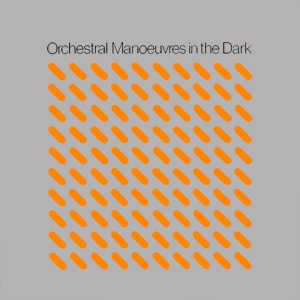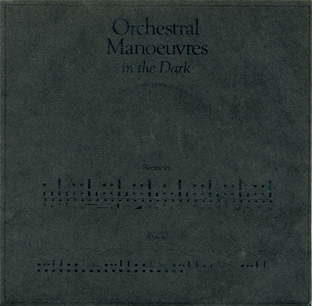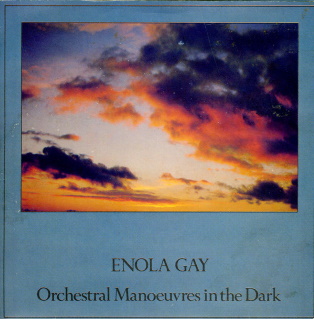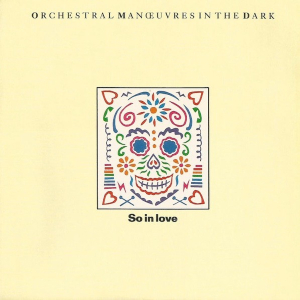
Orchestral Manoeuvres in the Dark (OMD) are an English electronic band formed in Wirral, Merseyside, in 1978. The group consists of founding duo and principal songwriters Andy McCluskey and Paul Humphreys, along with Martin Cooper and Stuart Kershaw (drums). Regarded as pioneers of electronic music, OMD combined an experimental, minimalist ethos with pop sensibilities, becoming key figures in the emergence of synth-pop; McCluskey and Humphreys also introduced the "synth duo" format to British popular music. In the United States, the band were an early presence in the MTV-driven Second British Invasion.
The Id were an English new wave/synthpop band from the Wirral, Merseyside, England, formed in 1977. They are best recalled as the precursor to the band Orchestral Manoeuvres in the Dark (OMD), in which Id members Andy McCluskey, Paul Humphreys (keyboards) and Malcolm Holmes (drums) would reunite; Gary Hodgson (guitar) would also reappear as a technician for the new group. A number of the Id's songs, including "Electricity", were re-recorded by OMD.
Dalek I Love You were a synthpop group from the Wirral, England. At various points in their existence, the band was also known as Dalek I. Record executives at Phonogram shortened the band's name without telling them for the "Freedom Fighters" single.
Alan David Gill is an English vocalist, guitarist and songwriter, who formed part of the synthpop band Dalek I Love You and the post-punk/neo-psychedelic band the Teardrop Explodes.

George Andrew McCluskey is an English singer, songwriter, musician and record producer. He is best known as the lead singer and bass guitarist of the electronic band Orchestral Manoeuvres in the Dark (OMD), which he founded alongside keyboard player Paul Humphreys in 1978: McCluskey has been the group's sole constant member. He has sold over 40 million records with OMD, and is regarded as a pioneer of electronic music in the UK. McCluskey is noted for his on-stage frenetic 'trainee teacher' dance.

Architecture & Morality is the third studio album by English electronic band Orchestral Manoeuvres in the Dark (OMD), released on 6 November 1981 by Dindisc. Inspired by religious music, the group sought to broaden their musical palette by utilising elaborate choral samples, the Mellotron, and other new instruments to create a more naturalistic, emotive sound. The artwork was designed by longtime OMD collaborator Peter Saville, along with associate Brett Wickens, while its title was derived from the book Morality and Architecture by David Watkin.

Orchestral Manoeuvres in the Dark is the debut studio album by English electronic band Orchestral Manoeuvres in the Dark (OMD), released on 22 February 1980 by Dindisc. Recorded at the group's Liverpool studio, it showcased their minimal synth-pop style and peaked at number 27 on the UK Albums Chart. "Electricity" and "Red Frame/White Light" were released as singles; a re-recorded version of "Messages" provided OMD with their first hit in the UK, reaching number 13.

"If You Leave" is a 1986 song by English electronic band Orchestral Manoeuvres in the Dark (OMD). It was recorded for the soundtrack to the film Pretty in Pink (1986), in which it is played prominently during the final scene. Along with 1980's "Enola Gay", the track has been described as OMD's signature song.

"Electricity" is the 1979 debut single by English electronic band Orchestral Manoeuvres in the Dark (OMD), featured on their eponymous debut album the following year. Andy McCluskey and Paul Humphreys sing the lead vocals on the track together in unison. Recognised as one of the most influential singles of its era, "Electricity" was integral to the rise of the UK's synth-pop movement. It has garnered praise from music journalists and other recording artists.

"Enola Gay" is an anti-war song by the English electronic band Orchestral Manoeuvres in the Dark (OMD), and the only single taken from their second studio album Organisation (1980). Written by lead vocalist and bassist Andy McCluskey, it addresses the atomic bombing of Hiroshima by the aircraft Enola Gay on 6 August 1945, toward the conclusion of World War II. As is typical of early OMD singles, the song features a melodic synthesizer break instead of a sung chorus.
Thomas Lang is an English, Liverpool-based singer-songwriter, best known for the jazz-tinged song "The Happy Man", which spent three weeks in the UK Singles Chart in January 1988, peaking at No. 67. He released his debut album, Scallywag Jaz in 1987. His last album release was The German Alphabet released in September 2016. Lang opened for Nina Simone at the royal festival hall and has worked with many of the jazz greatest artists. His bass player John murphy and Co writer David A Hughes went on to compose many film scores including lock stock and snatch and used him on the movie the Batchelor

"So in Love" is a 1985 song by English electronic band Orchestral Manoeuvres in the Dark (OMD), released as the first single from their album Crush. It reached the top 30 of both the UK Singles Chart and the US Billboard Hot 100, becoming their first entry on the latter. The track was a top 10 hit in Belgium and Holland.

"Secret" is a 1985 song by English electronic band Orchestral Manoeuvres in the Dark (OMD), released as the second single from their album Crush. Paul Humphreys sings lead vocals on the track. It became their second US Billboard Hot 100 entry, peaking at number 63, and also made number 34 on the UK Singles Chart.

Peel Sessions 1979–1983 is a compilation album by English electronic band Orchestral Manoeuvres in the Dark (OMD), released in 2000. The songs were recorded between 1979 and 1983 for the BBC Radio 1 show presented by John Peel. "Electricity" is added as a bonus track and is the original version that was featured on their debut single on Factory Records (FAC6). "Bunker Soldiers" was recorded for the first and fourth sessions; the version from the fourth session was not released on this album.

Martin Cooper is an English painter and a musician. He is the secondary keyboardist and occasional saxophonist for the band Orchestral Manoeuvres in the Dark, whom he first joined in 1980.

"Messages" is a song by English electronic band Orchestral Manoeuvres in the Dark (OMD) from their self-titled debut studio album (1980). A re-recorded version of the song was released on 2 May 1980 as the album's third and final single, reaching number 13 on the UK Singles Chart and becoming OMD's first top-40 entry. As with their debut single "Electricity", "Messages" features a melodic synth break instead of a sung chorus.

"Shame" is a song by English electronic band Orchestral Manoeuvres in the Dark (OMD), released as the third single taken from their 1986 album, The Pacific Age, although it is a re-recording made after the album's release, presumably in early 1987, and was produced by Rhett Davies.

Messages: Greatest Hits is a compilation release by Orchestral Manoeuvres in the Dark (OMD), issued in 2008. At the time it was the most comprehensive of the band's retrospective packages, featuring a CD of 20 charting singles and a DVD of all the band's music videos. Material was drawn from the group's recording career from 1979 to their first disbandment in 1996.
Godot was a synthpop band formed in England in November 1980, by Merseyside musicians Dave Hughes on instruments, and Keith Hartley on vocals and instruments.
Chris Shaw, also known as Chris Teepee, is an English musician from Upton on the Wirral. Shaw is a drummer, synthesizer player and guitarist who has played with various Wirral and Liverpool bands during the late 1970s and early 1980s.













